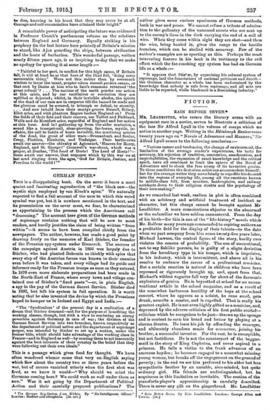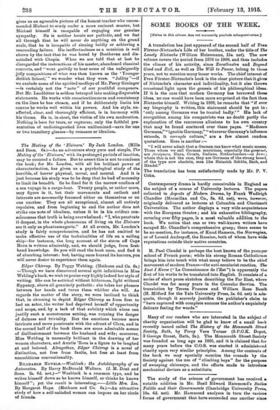FICTION.
RAIN BEFORE SEVEN.*
Ma. Lail:arms, who enters the literary arena with an equipment rare in a novice, serves to illustrate a criticism of the late Sir Alfred Lyall in the volume of essays which we notice in another page. Writing in the Edinburgh Review some twenty years ago on "Novels of Adventure and Manners," Sir Alfred Lyall comes to the following conclusion:— "Various causes and tendencies, the change of environment, the limitation of the average reader's experiences, his taste for accuracy, his rejection of tradition, convention, anachronism, and improbabilities, the expansion of exact knowledge and the critical spirit, hare all combined to limit the sphere of the Novel of Adventure and to check the free sweep of its inventive genius. To these conditions the first-olose artist can accommodate himself but for the average writer they serve fatally to expedite his descent into the regions of everyday life, among all the emotions known to middle-clara folk, from murders, bankruptcies, and railway accidents down to their religious doubt" and the psychology of their love•making."
As we remarked last week, realism in plot is often combined with an arbitrary and artificial treatment of incident or character, but this charge cannot be brought against Mr Leadbitter. A more conscientious objector to the abnormal or the unfamiliar we have seldom encountered_ From the day of his birth—for this is one of the " lifehistory " novels which Mr. Balfour many pare ago commended to aspiring authors as a profitable field for the display of their talents—to the data when we part company from him some twenty-five years later, Michael Lawson, the central figure of the story, hardly ever violates the canons of probability. The son of unemotional, not to say fishlike parents, he is guilty of a slight deviation from the hereditary type in his temper, which is impulsive, in his industry, which is intermittent, and above all in his resolve to embrace the career of a professional musician. But a certain reaction he natural in children who have been repressed or rigorously brought up, and, apart from that., Michael's wildest vagaries fall very far short of the daemonic explosions of genius. He is boycotted at school for an =Con- ventional article in the school magazine, and as a result of the somewhat barbarous hostility of the boys at the school concert, where he appears as a soloist, be runs amok, gets drunk, assaults a master, and is expelled, That is really his greatest exploit. He isnot even highly gifted as a musician, and, depressed by the adverse criticism of his first public recital-- criticism which he recognizes to be just—throws up the sponge and is content to earn his bread and butter by playing at a cinema theatre. He loses his job by offending the manager, and ultimately abandons music for commerce, joining his brother, a successful inventor. For the rest, he is ousceptiblo, but not fastidious. He is not the counterpart of the beggar- maid in the story of King Cophetua, and never aspired to a princess. He falls a victim to the frank advances of an amorous hoyden; he becomes engaged to a somewhat mincing young woman, but breaks off the engagement on the ground of poverty; in the end we see him preferred to his abler but less sympathetic brother by an amiable, nice-minded, but quite ordinary girl, His friends are undistinguished, but he acquiesces in this limitation as inevitable. The routine of the pianoforte-player's apprenticeship is carefully described There is never any gilt on the gingerbread. Mr. Leadbitter • Hain Word Saes. Ey Erie Leadbitter. London: George Men di 'Morin [On]
gives us an agreeable picture of the honest teacher who recom- mended Michael to study under a more eminent master, but Michael himself is incapable of engaging our genuine sympathy. Be is neither heroin nor pathetic, and we feel all through that he will never do anything on the grand scale, that he is incapable of sinning boldly or achieving a resounding failure. His ineffectualness as a musician is well shown by the fact that he was bored by Beethoven and dis- satisfied with Chopin. When we are told that at last he disregarded the instructions of his master, abandoned classical concerts, and "went guiltily to hear some of the unfeignedly jolly compositions of what was then known as the ' Younger British School,' " we wonder what they were. "Jollity "—if we exclude some of the spirited medleys of Mr.Percy Grainger —is certainly not the " note " of our youthful composers. But Mr. Leadbitter is seldom betrayed into making disputable statements. He works with conscientiousness and consistency on the lines he has chosen, and if he deliberately limits his canvas he works well within his powers. And his style, un- affected, clear, and thoroughly efficient, is in harmony with his theme. He is, in short, the victim of his own moderation. Nothing is here for tears, or raptures; only the faithful pre- sentation of undistinguished lives unillumined—save for one or two transitory gleams—by romance or idealism.







































 Previous page
Previous page